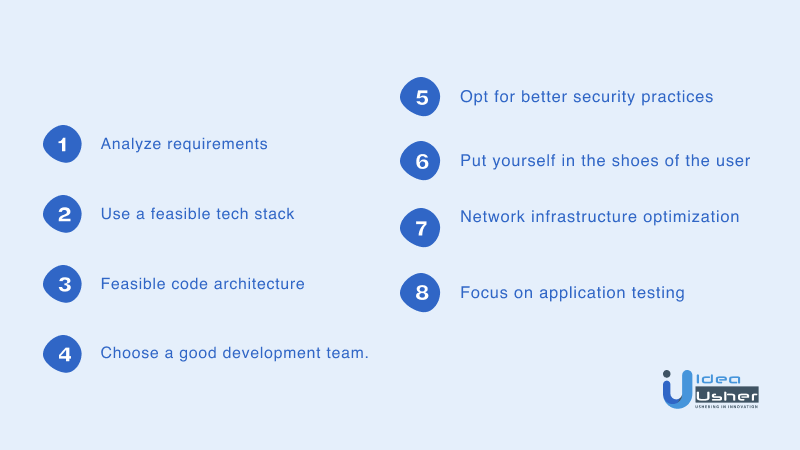Scalability. Everybody says it’s crucial. But what does that mean, exactly? When will you know that my app is scalable? How do you know that it scales now? Is there even a way to test this? I suspect that they are the questions you have too. If your app is starting, then scalability may not be on your mind quite yet.
However, mobile app scalability is one of the most important (if not THE most important) issues for the app’s success. Here, we will look into what scalability means and how you can ensure your app isn’t just lovable but scalable.
What is the Scalability of An App?

The scalable mobile app is a term used to describe an application, which can sustain a heavy load of users at any given time.
Scalability is one of the essential aspects of any code, whether it’s web-based or mobile.
In simple words, it means that a program can grow appropriately when required to do so. In a mobile app, scalability is mainly designed for apps that can sustain a load of users at any time, no matter when they use the app by turn or all at once.
Mobile app scalability is critical, and the complexity curve continues to rise sharply. The more popular your app becomes, the more servers you may need to host your services. And the more servers you have, the harder it becomes to manage them all effectively.
Examples of Highly Scalable Apps
It’s easy to spot highly scalable apps. Take your phone out and look if there are Amazon, Facebook, Spotify, Google, Netflix, etc., installed, then you already know them.
Here are two great examples of app scalability.
Music Streaming Platforms

The standard answer is that the cost of streaming goes down as more people use it. It’s hard to imagine how Apple Music or Spotify can scale further, but they do it every month. They centralize the metadata to see the duplicate titles for a given artist or track and have a similar-looking UI.
Video Streaming Apps
Popular video streaming Netflix uses Cassandra for storing data, Storm for processing large amounts of data from the machines running the application, AWS cloud for hosting its services, and many other technologies. But what caught my attention was how they handle vast amounts of requests from all over the world using auto-scaling.
Auto-scaling is a strategy for coping with variable demand by building systems that can dynamically alter their capacity to match the demand. It is a technology that Amazon Web Services first popularized. It allows you to set up a cluster of computers and automatically expand or shrink to meet your needs.
Why Should You Focus On App Scalability?

As an extreme example, look at the startup Withings. They make a scalable mobile app designed for health monitoring and tracking: an app with a heart rate monitor and pedometer, and so on. But the only reason anyone would buy one of their products is if they wanted to track their health, and they were willing to pay for it.
The most important thing about your app is that it is scalable. By “scalable,” we mean that more and more people can use it without collapsing.
Ability to sustain users in bulk at any given time
It’s not just about scraping up new users but also sustaining the existing users.
The common assumption that scaling your app up to a billion users is easy and cheap is misguided. If you try to scale your business by adding servers at the rate you can add users; you will fail catastrophically.
You will not be able to sustain the traffic you get from new users for very long.
Your servers may become overloaded and break down. Your network capacity may become saturated and fall short of what your customers need at any given time.
How to Make Your Apps Scalable?
As your audience grows, your app will grow with it, changing what it does and what it looks like. Unless you stop this growth, the app will become less and less effective for its initial purpose. Here are some tips to increase mobile app scalability.

1. Analyze requirements
When your app starts to feel slow, the first thing to do is measure the servers’ load. If they are overloaded, then adding a server or two will make a big difference.
2. Use a feasible tech stack
The right tech stack depends on your actual requirements. The priorities are different from those of a more prominent company with more resources when you’re starting. You don’t need a lot of fancy new technology; you need whatever works best for what you’re trying to do.
3. Feasible code architecture
It means designing an application to grow without having to overhaul the entire thing at once. Thus, when the load on the application increases, you can scale up the software to meet the needs.
4. Choose a good development team
If you want to build something that will stay good for years, you need to invest in your team. They have to be experienced with your app and its particular technology stack and requirements and quirks and non-standard features. Idea Usher can provide you with a specialized and experienced development team.
5. Opt for better security practices
You have to have a written plan, understand the value of the data you are processing, and have a security plan in place.
6. Put yourself in the shoes of the user
Think about how users will be using your software. If you’re making a website or app, think about how people use it on their phones or desktops.
7. Network infrastructure optimization
The right way to build an app is always to make it grow from a single machine serving a few users to a globally distributed service that helps millions of users. The challenge is building an infrastructure that can scale gracefully over time.
8. Focus on application testing
It is a good idea to test your application as it is being built. You can create a mockup of your app and see how it works. It will allow you to find bugs before they have been coded into the app.
Takeaway
One of the essential things about scaling an app is that the more people who use your service, the more likely it will be that some will find and use all of your features.
If you’re going to build a business, your job is not just to make something great but also to make it easy for people who already like what you’re doing to tell their friends about it.
With Idea Usher, you can understand how app scalability works and how you can employ different methods to ensure that your app has steady scalability. Engage in a free consultation call to explore your options.
A Skilled Developer For Every Project
Trusted by 100+ clients
FAQs
1. What is app scalability?
Mobile app Scalability is a web-based app that creates a cloud-hosted collaborative web app just for you. As the scale of your application grows, so does the need for high performance.
2. Why is it essential to get scalability for my app, even if I own a small business?
If you have a small and growing business, you are eventually going to need app scalability.
3. How will you help?
We have experience in developing apps that have skyrocketed in their sectors. We treat our clients’ ideas like our companions because we care for them.



















